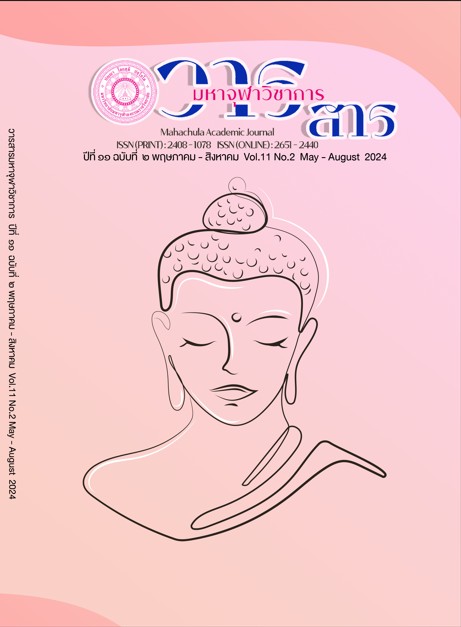Influencing Factors on Intention to Use AI Hotel of Thai Tourists
Main Article Content
Abstract
This research aimed to study the influencing factors on the intention of using AI hotels of Thai tourists. A questionnaire was used as a tool to collect data from 421 samples who traveled and used hotel service with convenience sampling. The statistics used to analyze the data were frequency, percentage, mean, standard deviation, and analysis of structural equations.
The findings found that the attitude and subjective norm influenced the intention of using AI hotel with statistically significant at the .01 level, respectively. The perceived ease of use and technology perceived benefit affect the attitudes statistically significant at the .01 level, respectively. Technology anxiety had a negative effect on the attitude with a statistically significant at the .01 level, and the perceived ease-of-use had a statistically significant effect on the perceived benefit of technology with a statistically significant at the .01 level. While the adherence factor was statistically significant at the .01 level. The stickiness to traditional service does not affect attitude factors and does not affect the intention of using AI hotel.
Article Details

This work is licensed under a Creative Commons Attribution-NonCommercial-NoDerivatives 4.0 International License.
References
Comrey, A.L. & Lee, H.B., A first Course in Factor Analysis. Hillsdale, New Jersey: Erlbaum, 1992.
Curran, J.M. & Meuter, M.L., “Self-service technology adoption: comparing three technologies”. Journal of Services Marketing. Vol. 19 (2005): 103-113.
Davis, F.D., Bagozzi, R.P. & Warshaw, P.R., “User Acceptance of Computer Technology: A Comparison of Two”. Management Science. Vol. 35 No. 8 (1989): 982- 1001.
Fishbein, M. & Ajzen, I., Belief, Attitude, Intention and Behavior: An Introduction to Theory and Research. Addison-Wesley: Reading, MA, USA, 1975.
Hair, J.F., Hult, G.T.M., Ringle, C.M., Saestedt, M. Danks, M.N.P. & Ray, S., Partial Least Squares Structural Equation Modeling (PLS-SEM) Using R. A Workbook, Springer, 2021.
Kaushik, A.K., Agrawal, A.K. & Rahman, Z., “Tourist behaviour towards self-service hotel technology adoption: trust and subjective norm as key antecedents”. Tourism Management Perspectives. Vol. 16 (2015): 278-289.
Kim, C., Mirusmonov, M., & Lee, I., “An empirical examination of factors influencing the intention to use mobile payment”. Computers in Human Behaviour. Vol. 26 No. 3 (2010): 310-322.
Litvin, S.W., Goldsmith, R.E. & Pan, B., “Electronic word-of-mouth in hospitality and tourism management”. International Journal of Contemporary Hospitality Management. Vol. 30 No. 1 (2018): 313-325.
Lin, J.C.C., “Online stickiness: its antecedents and effect on purchasing intention”. Behaviour and Information Technology. Vol. 26 No. 6 (2007): 507-516.
Mangno, F., Cassia, F. & Bruni, A., “Adoption and impact of marketing performance assessment systems among travel agencies”. International Journal of Contemporary Hospitality Management. Vol. 29 No. 4 (2016): 1-21.
Meuter, M.L., Ostrom, A.L., Roundtree, R.I. & Bitner, M. J., “Self-service technologies: Understanding customer satisfaction with technology-based service encounters”. Journal of Marketing. Vol. 64 (2000): 50-64.
Meuter, M., Ostrom, A. L., Bitner, M. J. & Roundtree, R., “The Influence of Technology Anxiety on Consumer Use Experiences with Self-Service Technologies”. Journal of Business of Research. Vol. 56 No. 11 (2003): 899-906.
Parasuraman, A.P., “Technology Readiness Index (Tri): A Multiple-Item Scale to Measure Readiness to Embrace New Technologies”. Journal of Service Research. Vol. 2 No. 4 (2000): 307-320.
Seilov, G.A., “Does the adoption of customer and competitor orientations make small hospitality businesses more entrepreneurial? Evidence from Kazakhstan”. International Journal of Contemporary Hospitality Management. Vol. 27 No. 1: 71-86.
Sharma, R., Uniyal, M. & Sharma, N., “Emerging Use of Artificial Intelligence, Robots & Service Automation in Hotel Industry”. International Journal of Future Generation Communication and Networking. Vol. 13 No. 3 (2020): 2785–2790.
Wang, S., “Applications of AI in Hotel Management and Its Effect on Customer Ratings”. Master of Science in Hospitality Management. California State Polytechnic University, Pomona, 2020.
Flyzoo Hotel, Flyzoo Hotel Website. [Online]. Available: https://flyzoo-hotel.hangzhouhotel.org/en/. [1 February 2021].
Henn Na Hotel, Henn Na Hotel Website. [Online]. Available: https://www.hennnahotel.com/ginza/en/. [1 February 2021].
TechRepublic, Experts predict hotel rooms will be tech dominated by 2034. [Online]. Available: https://www.techrepublic.com/article/experts-predict-hotels-dominated -by-new-tech-in-2034/. [1 February 2021].


